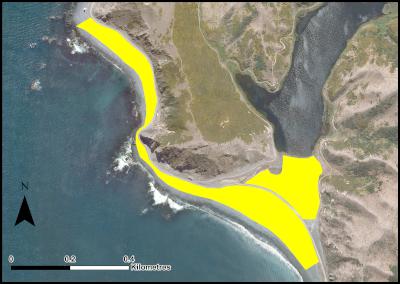Rahui returns to protect Banded Dotterel at Pencarrow
Rahui returns to protect Banded Dotterel at Pencarrow

Iwi have once again placed a rahui (ban) on disturbing Banded Dotterels on the beach at Pencarrow Head, south of Eastbourne, to encourage successful nesting of the birds, which are at risk of predators and human disturbance.
Kaumatua from Local iwi Taranaki Waanui placed the rahui on the beach this week, which will last throughout summer until February next year at the end of the birds’ breeding season. It follows a similar intervention last year which, coupled with other measures, helped lift successful nesting rates among the small population of Banded Dotterels.
Greater Wellington Regional Council studies have shown that in 2011 just one successful hatching was achieved from 16 nests, with only two in 2012. With the imposition of the rahui in 2013, and a predator control programme aimed at feral cats, hedgehogs and stoats supported and implemented by local volunteer groups, 10 out of the 16 nests have hatched. Hopefully, this breeding season (August to February) will bring as good or even better results for the colony.
The purpose of the rahui is to protect the birds’ habitat by prohibiting vehicles, dogs and horses on well signposted sections of the beach. The fragile nests, often situated among the sand, are very difficult to see and pedestrians are asked to stay off the beach or only walk below the high tide line.
Public access is still available to the historic Pencarrow Lighthouse, to the lakes via the roadway and to the beaches north of the nesting sites.
Over the last few years, the role of Kaitiakitanga within Taranaki Wāanui has grown enormously in relation to the Parangarahu Lakes, not only in management planning but also in working with Greater Wellington Regional Council on an intensive programme of monitoring and predator control. This work has been further strengthened by the volunteer support of the Mainland Island Restoration Operation and Friends of Baring Head community groups.
ENDS


 Gordon Campbell: On The Government’s Epic Fails In Jobs And Housing
Gordon Campbell: On The Government’s Epic Fails In Jobs And Housing Southern Lakes Sanctuary: Endangered Endemic Birds Flock To Makarora Following Proactive Predator Trapping
Southern Lakes Sanctuary: Endangered Endemic Birds Flock To Makarora Following Proactive Predator Trapping Kāinga Ora: Kāinga Ora Refocusing On Its Core Mission
Kāinga Ora: Kāinga Ora Refocusing On Its Core Mission New Zealand Labour Party: Still No Commitment To Build More Public Houses
New Zealand Labour Party: Still No Commitment To Build More Public Houses Crown Response to the Abuse in Care Inquiry: New Website In Response To Royal Commission Call For Records Support
Crown Response to the Abuse in Care Inquiry: New Website In Response To Royal Commission Call For Records Support New Zealand Government: Online Portal For COVID-19 Inquiry Opens
New Zealand Government: Online Portal For COVID-19 Inquiry Opens Aotearoa Workers Solidarity Movement: Jacinda Ardern - The Myth of Kindness and the Reality of Division
Aotearoa Workers Solidarity Movement: Jacinda Ardern - The Myth of Kindness and the Reality of Division


